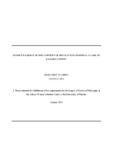| dc.description.abstract | There has been considerable debate in the literature on women’s participation and role in public
administration and management. Devolution, currently in its third year of implementation in
Kenya, offers a good platform on which to advance this dialogue further. This study argues that
women’s agency can be maximized using the devolution platform in order to improve economic,
political and social wellbeing for women and their communities. Important questions that the
study has sought to explore include, whether the current devolution platform recognizes women
as economic, political and social actors and in so doing freely provide spaces for leadership and
active agency, and whether it builds their capacity to negotiate space, improve entrepreneurship,
and their collective political voice. The study also looks at how informal factors affect women’s
agency. While formal policies and laws are legitimized through written policies and laws
including the National Constitution (2010), political party manifestos of the ruling parties and
Acts of Parliament, informal rules and norms are legitimized through culture and traditional
views that become normative over time. The interplay of formal and informal factors was
therefore an important area for exploration.
The study is founded on a feminist and rational choice theoretical framework, identified as a
critical analytical premise for interrogating women’s agency. Primary data was collected using a
mixed methods approach, where both qualitative and quantitative research techniques were
utilized to respond to the research questions. To ascertain the current manifestations of women’s
agency in economic, political and social spheres, a structured questionnaire was administered.
Qualitative methodologies including focus group discussions, oral testimonies, key informant
interviews and observation were used to provide an in-depth understanding of the core research
concerns. Quantitative data was analyzed using Statistical Package for Social Sciences and
Statistical Analyses Software, and measurements done using Fisher’s exact and Chi-Square tests.
Using theoretical propositions, qualitative data was subjected to a process of data reduction;
categorization into a matrix of emerging themes, and causal relations in the data was attended to.
The findings agree with the view that benefits from devolution do not automatically accrue to
women, or all categories of women since women are not a seamless homogenous group, with
shared interests and objectives. It is clear from the research that devolution has a core role to play
in enabling maximization of economic, political and social agency, but there is need to build and
nurture women’s capacity to engage for them to reap maximum benefits from devolution. The
study recommends that both the County Government and the County Assembly in Kajiado
should adopt a gendered perspective in legislation and implementation of devolution to boost
women’s agency. Women’s capacity and conscientisation for agency through education,
sensitization and training in addition to political mobilization are essential to enhance their
participation and meaningful engagement individually or collectively, for the full benefits of
devolution to be realized in Kajiado. With devolution still evolving, a second phase of research
on women’s agency in the County, enriched with cross-county comparisons, would be insightful
given that this study took place when devolution was still in its nascent stages. | en_US |

